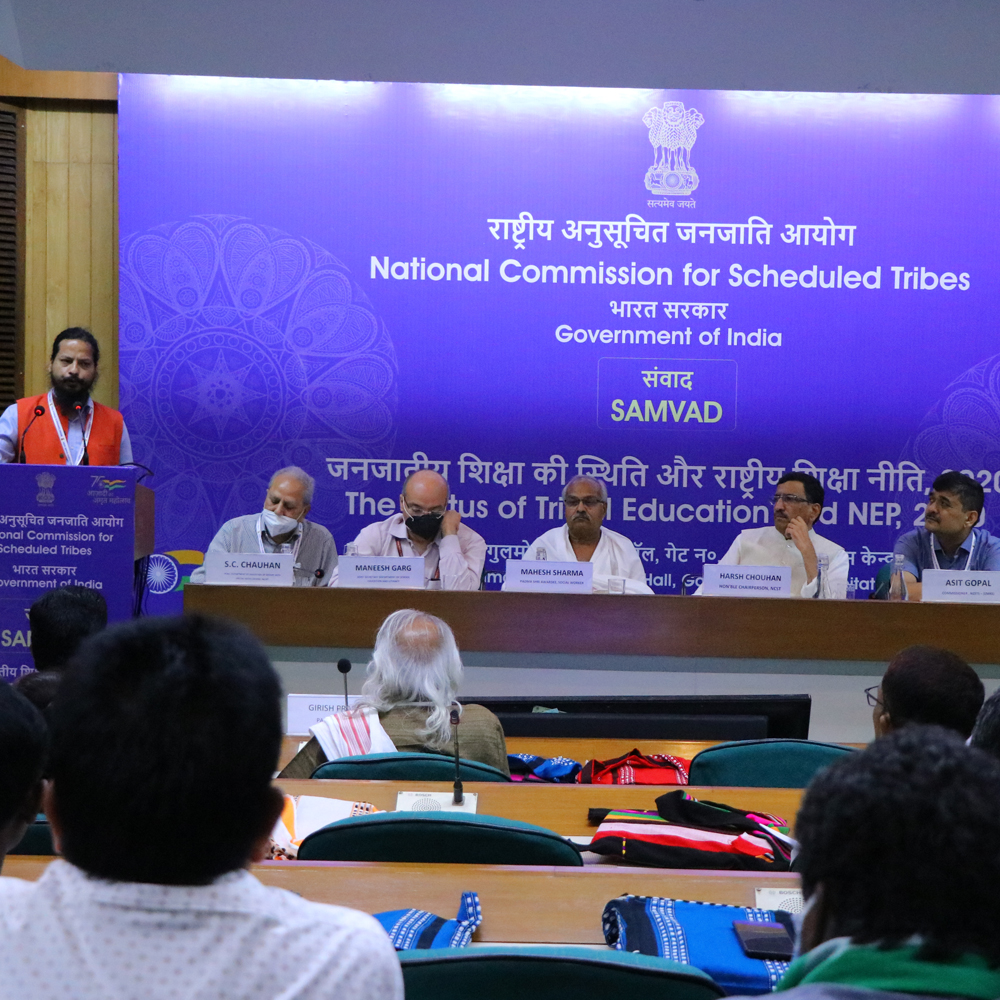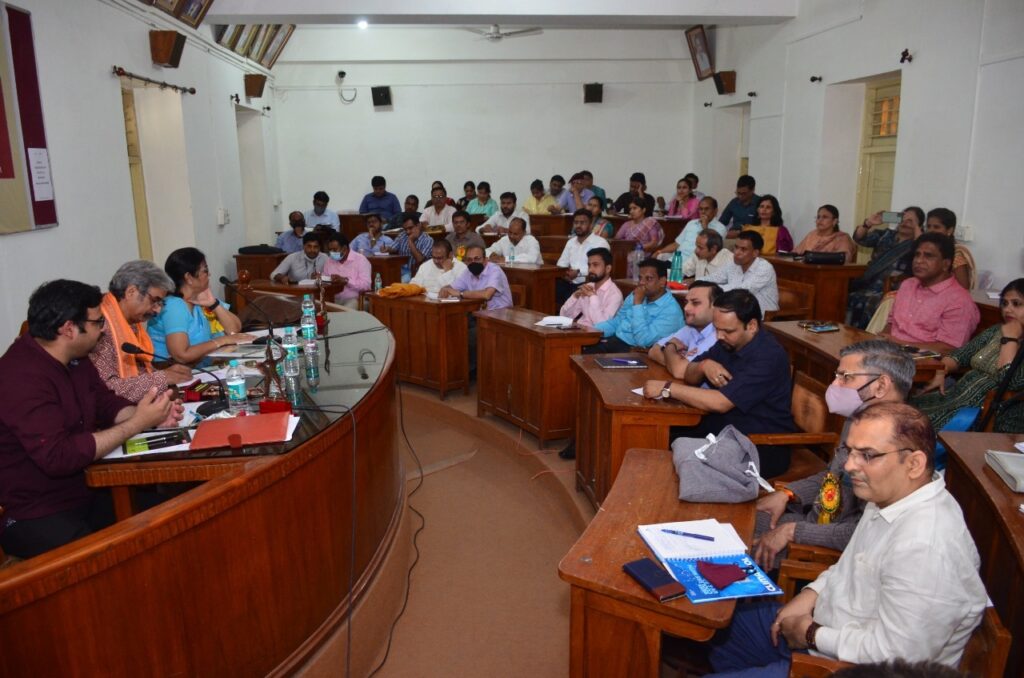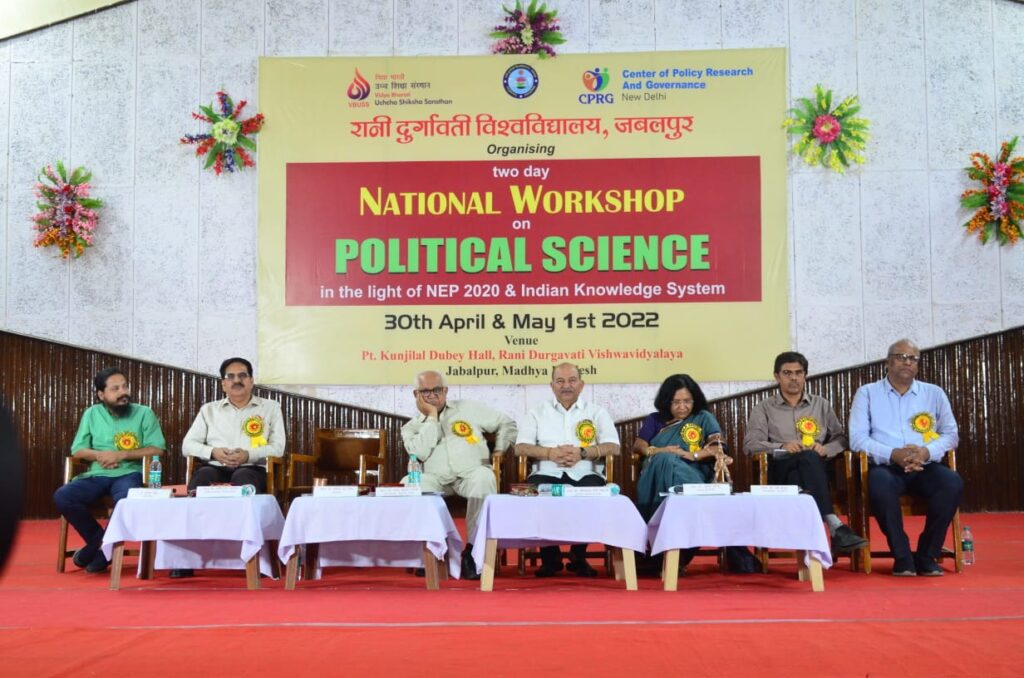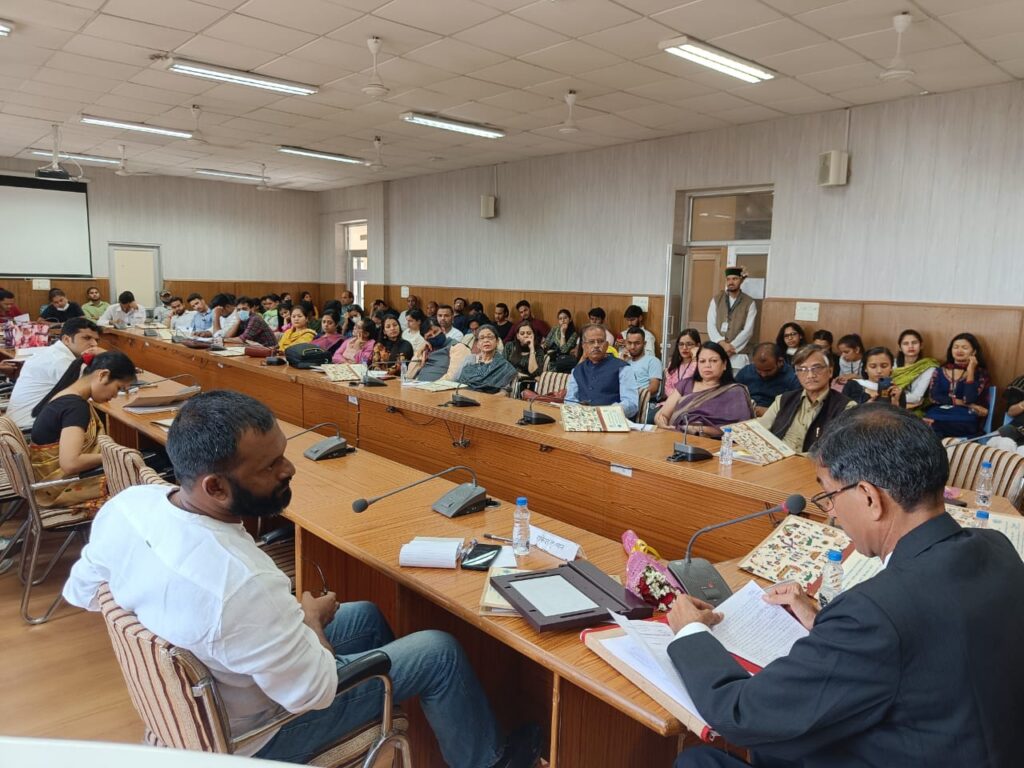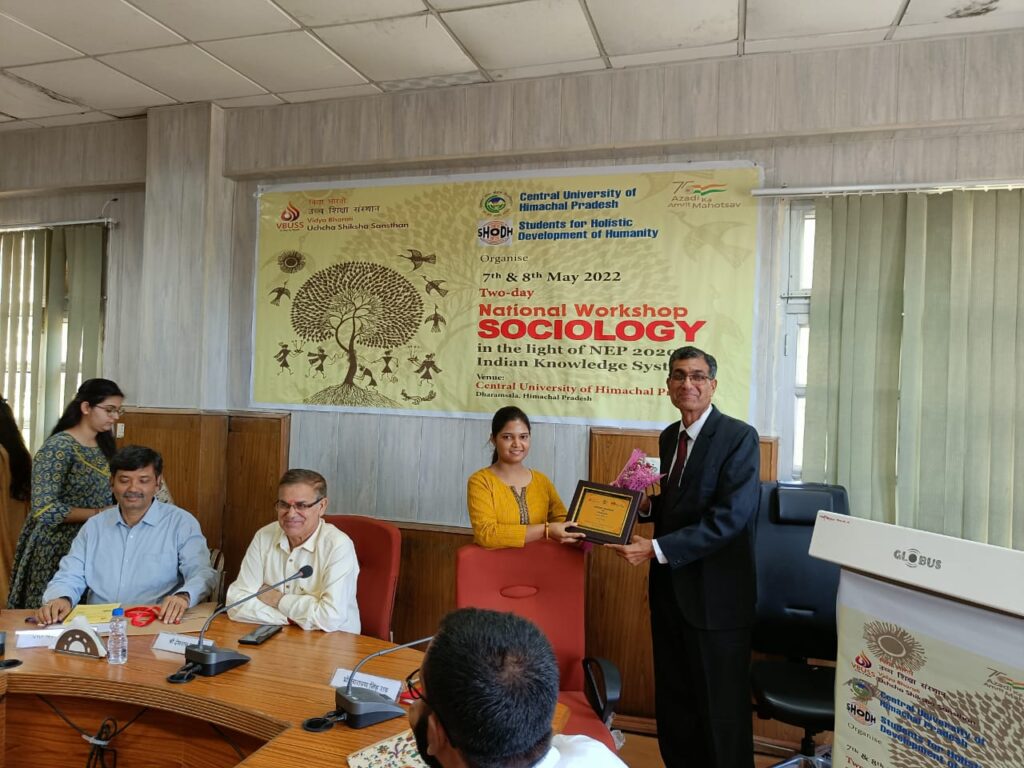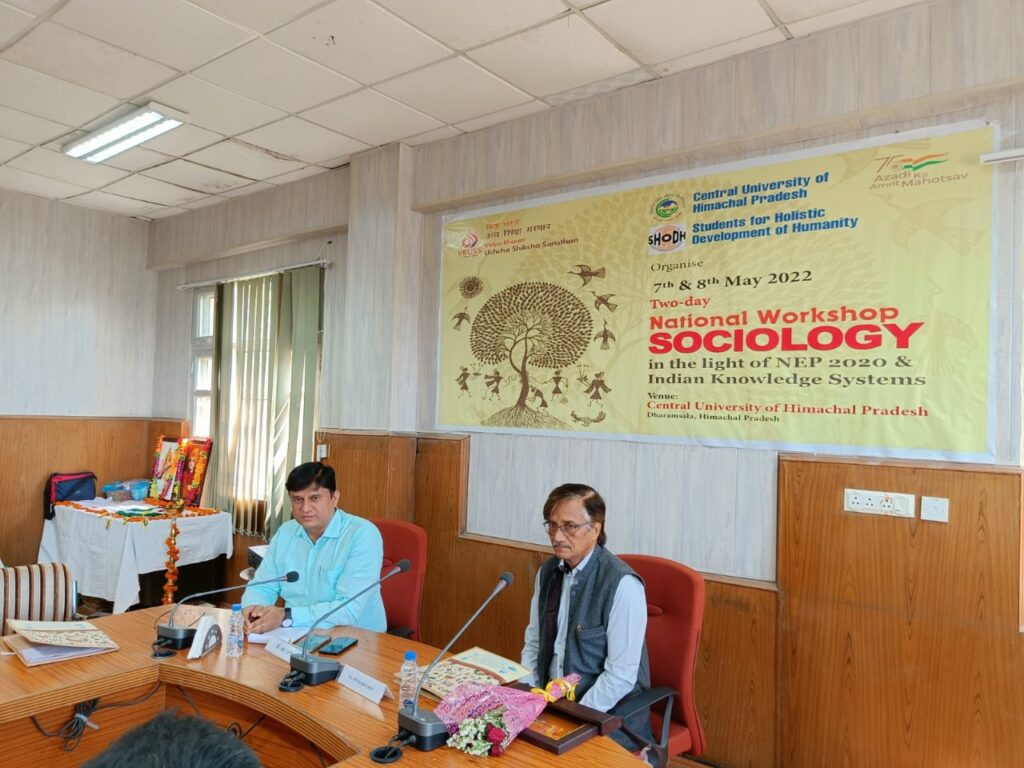India’s Vaccine Diplomacy in COVID-19: Impact and Prospects
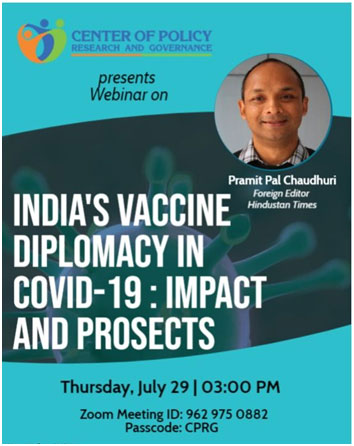 India, in January 2021, initiated its vaccine diplomacy known as the Vaccine Maitri Programme, which, though remained short-lived, had its impact felt on the global stage. It sent a strong message, in contrast to the then growing trend of Vaccine Nationalism, highlighting India’s commitment to the humanitarian and equitable reach of the Vaccine, particularly within India’s neighborhood. The session, which was addressed by Mr. Pritam Pal Chaudhary, the Foreign Editor of the Hindustan Times, threw light on the impact and prospects of India’s diplomacy during the COVID-19 pandemic.
India, in January 2021, initiated its vaccine diplomacy known as the Vaccine Maitri Programme, which, though remained short-lived, had its impact felt on the global stage. It sent a strong message, in contrast to the then growing trend of Vaccine Nationalism, highlighting India’s commitment to the humanitarian and equitable reach of the Vaccine, particularly within India’s neighborhood. The session, which was addressed by Mr. Pritam Pal Chaudhary, the Foreign Editor of the Hindustan Times, threw light on the impact and prospects of India’s diplomacy during the COVID-19 pandemic.
The Plight of Government Schools During the Pandemic
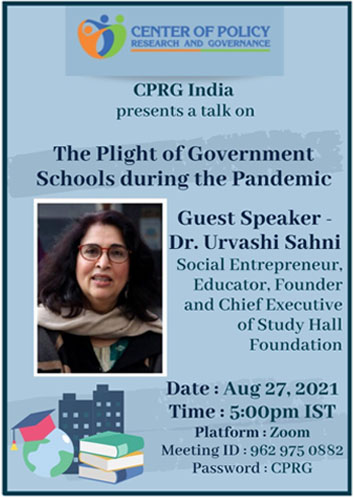 The Covid 19 pandemic has taken a heavy toll on every sector of life and the economy. Amongst the worst affected sectors, is the education sector, hit hard by the epidemic. Though there’s an uptick in education from the initial hiatus, through the introduction of digital education, it is still not accessible to all. In this webinar, our guest speaker, Dr. Urvashi Saini, significantly touched upon the impact of covid on the education sector, delving deep into the intense problem faced by the government schools in this era of digital education clubbed with covid.
The Covid 19 pandemic has taken a heavy toll on every sector of life and the economy. Amongst the worst affected sectors, is the education sector, hit hard by the epidemic. Though there’s an uptick in education from the initial hiatus, through the introduction of digital education, it is still not accessible to all. In this webinar, our guest speaker, Dr. Urvashi Saini, significantly touched upon the impact of covid on the education sector, delving deep into the intense problem faced by the government schools in this era of digital education clubbed with covid.
Navigating the Future of Indio-Afghan Relations
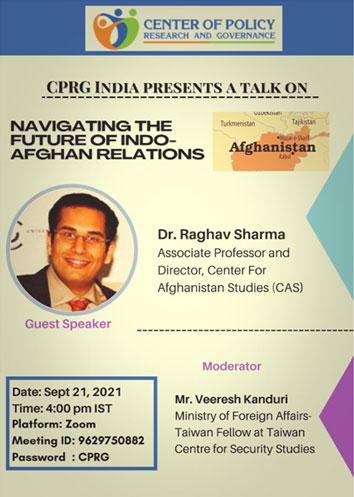 The developments in Afghanistan are at the cynosure of contemporary geopolitics. The changing world order, with the USA backing out of Afghanistan after 20 years and a regressive pro-Islamic regime capturing the government by force, makes it imperative to look at the new Indo-Afghan ties and its future, to reorient India’s foreign policy. The guest speaker, Dr. Raghav Sharma, talked about what India’s strategy should be in dealing with the Taliban and utilizing this opportunity to cement its dominating position in the Asian region.
The developments in Afghanistan are at the cynosure of contemporary geopolitics. The changing world order, with the USA backing out of Afghanistan after 20 years and a regressive pro-Islamic regime capturing the government by force, makes it imperative to look at the new Indo-Afghan ties and its future, to reorient India’s foreign policy. The guest speaker, Dr. Raghav Sharma, talked about what India’s strategy should be in dealing with the Taliban and utilizing this opportunity to cement its dominating position in the Asian region.
‘Legalisation of Cannabis: The Next Big Question of Civil Liberties in India’.
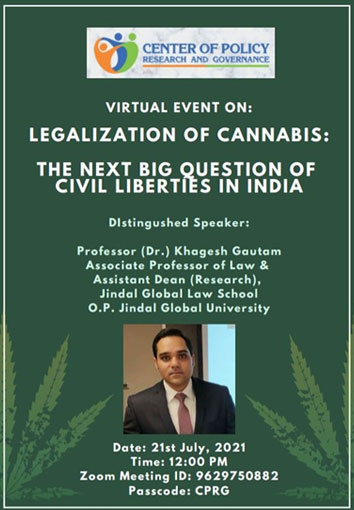 Centre of Policy Research and Governance organised a seminar on 21st July 2021 pertaining to cannabis. Prof. Khagesh Gautam was invited as the Guest Speaker for the event on the theme of his upcoming book, ‘Legalisation of Cannabis: The Next Big Question of Civil Liberties in India’.
Centre of Policy Research and Governance organised a seminar on 21st July 2021 pertaining to cannabis. Prof. Khagesh Gautam was invited as the Guest Speaker for the event on the theme of his upcoming book, ‘Legalisation of Cannabis: The Next Big Question of Civil Liberties in India’.
‘The Future of Technology, Innovation and Entrepreneurship under the National Education Policy
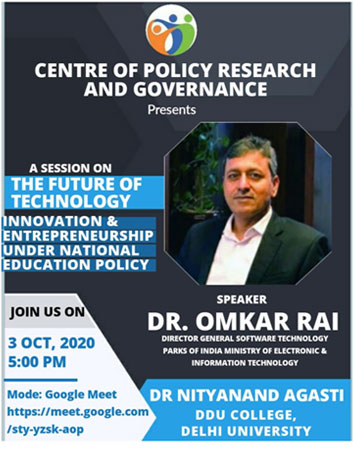
Dr. Omkar Rai addressed a session on ‘The Future of Technology, Innovation and Entrepreneurship under the National Education Policy on 3rd October, 2020 organised by The CPRG.
National Education Policy : Prospects and Challenges

Dr Ramanand Pandey spoke on NEP-2020 in Dr. RML Univesity, Ayodhya on 28th August 2020. He shared his experience as a member who was involved in the entire process. He joined MHRD as consultant to assist NEP related work.
Workshop in Collaboration with NCST:
CPRG along with National Commission for Scheduled Tribes organised a two-day workshop on the theme ‘Samvad on Tribal Education’. The workshop comprised various sessions addressed by people from government ministries, public institutions like NCST, and experts from civil society. The concluding session was addressed by Shri Dharmendra Pradhan, Minister of Education, Government of India. Shri Arjun Munda, Minister of Tribal Affairs, and Dr. Subhas Sarkar, Minister of State for Education addressed sessions on various themes. The overall ambit of the workshop extended to discuss the loopholes in the education policy of India which has perpetrated the disadvantageous position of STs in society. It also elaborated on how the inclusive provisions of NEP 2020 can be implemented to suit the peculiar needs of ST students.
National Commission of Scheduled Tribes is a constitutional body formed under Article 338A of the Indian Constitution. Article 338A empowers the NCST to oversee the implementation of the safeguards provided to the Scheduled Tribes under the Constitution of India or any other law in force in the country. NCST discharges the functions related to the welfare of the Scheduled Tribes and participates in planning the process of socio economic development of the tribal population.
NCST has been tirelessly making efforts towards the advancement of the Scheduled Tribes and the organization of SAMVAD was one of the most important efforts towards the fulfillment of their goals. SAMVAD organized by NCST in collaboration with Centre of Policy Research and Governance (CPRG) was an attempt to involve the grassroots in the analysis of the impact of the National Education Policy, 2020 on the Tribal community. The conference endeavored to ensure the involvement of all the stakeholders in the effective implementation of the NEP in the tribal areas of India.
National Education Policy is striving to bring about a paradigm shift in the pedagogy of the education system in India. One of the main components of the much needed NEP in consonance with the Sustainable Development Goal 4 is inclusive education through the involvement of community which has been the goal of the Government of India since times immemorial. National Education Policy aims to provide shape to this goal of the government by making us realize that social justice and social inclusion are at the core of making the education system effective and successful and NCST’s organization of SAMVAD was a step ahead in the furtherance of this goal thereby making the process more participatory and democratic.
SAMVAD began with a brief introduction about the status of tribal education in India. One of our esteemed speakers and the Chairman of NCST honored Bhagwaan Birsa Munda and Neha Sinah introduced the speakers with a brief introduction on each one of them. The conference moved ahead with the speakers welcoming the delegates and delineating the aim of the conference in a holistic and coherent manner.
Workshop on Political Science at Rani Durgavati Vishwavidyalaya, Jabalpur:
Vidya Bharti Uccha Shikshan Sansthan in collaboration with Rani Durgavati Vishwavidyalaya, Jabalpur (M.P.) and CPRG organised a two-day workshop named ‘Preparatory Workshop on Political Science in the Light of NEP 2020 and Indian Knowledge Systems’ to discuss issues pertaining to the state of education of political science in India. The Inaugural session of the workshop was addressed by Dr Ramanand, Professor Narendra Kumar Taneja, Shri Prakash Mani Tripathi and Dr. Sushma Yadav. Held from 30th April to 1st May, it focused on the methods and content of Political Science education in India, especially in the new context provided by National Education Policy 2020.
The workshop highlighted the need for amends in the Indian schools’ curricula and textbooks which could be done by incorporating teachings from our scriptures like the Mahabharata and the concept of Dharma. As envisaged by the National Education Policy, 2020, due attention should be paid to the creation of our textbooks so that they can have the Indian component. The workshop also discussed ways to include the Indian knowledge system and the Indian context in the study of political science. Scholars, researchers, and members of academia from all over India will come together to share their unique perspectives and experiences, inspire and learn from each other, uncover new trends, discuss common challenges, and brainstorm creative solutions related to the education and curriculum of political science.
The speakers opined the need to highlight India’s diplomacy and contributions in dealing with International issues and its participation in global summits like G-20. They also emphasised on the influence of the west on disciplines like International Relations which are being taught in Indian Schools. These ‘west centred’ disciplines with all its jargon and conceptual frameworks lead to an inevitable disconnect between what the student is taught and what is seen in the world apart from the West. This justifies the need for the concept of treating India as ‘differently different’, i.e analyzing India from its own lens since it is separate from the west and the rest of the world. The workshop also dissected the infamous dilemma that concerns the teaching methods in Indian schools. There is always a difficulty faced by teachers in fostering experiential learning with practical examples while teaching subjects like political science theories. The solution to this as agreed by the panel and audience was that each student must have the basic knowledge of the concept, which in the above mentioned scenario could be the Constitution. This would help them relate theory to their understanding of practical situations like acquiring the relevant means of grievance redressal in case of infringement of their rights. The workshop was concluded by a discussion on the concept of governance which entails the involvement of people which makes it quintessential to develop citizens in such a way that the process of inculcating values of a global citizen into the demographic dividend of India becomes much more effective.
Workshop on Sociology at Central University of Himachal Pradesh (Dharamshala):
CPRG was involved in the organisation and management of the two-day National Workshop on Sociology in the light of NEP 2020 and Indian Knowledge Systems, held on 7-8 May 2022. The workshop was organised by Vidya Bharti Uccha Shikshan Sansthan in collaboration with SHODH and the Central University of Himachal Pradesh. The workshop aimed to divulge in the course correction of Sociology to communicate the trajectory of the Indian Society to its new generation in such a way that they begin revering to the culture and ethos of India instead of idolising the West. CPRG helped in indigenising the curriculum of Sociology by reviewing NCERTs of Sociology and suggesting changes to them, which were used as important discussion points by the speakers. CPRG and its interns were also involved in inviting intellectuals, preparing the schedule for the conference, managing accommodations of the delegates, and preparing reports on the workshop.
The eight sessions of the National Workshop had discussions varying from defining India in Indian Sociology and working towards crafting sources and methods for understanding the Indian Society thereby moving towards preparing Indian Sociology for the 5th Industrial Revolution taking place in the world. It brought the attention of the audience towards the fact that Indian Sociology is still an extension of the colonial metanarrative. There is a focus on the need to train people to rewrite the textbooks and stop seeing Sociology from the lens of the western society. This was followed by an open discussion where the stakeholders were invited to present their views on the sources and methods of Understanding the Indian Society and the need to move away from the Eurocentric view and understand the soul of the Indian Society. Indianness should be promoted in children from the foundational stage itself so that the customs and traditions of India should seep in the student’s mind from the very beginning.
The workshop also highlighted strategies for linking Global and Indian Sociology by narrowing boundaries all across the world. The speakers quoted various successful examples from India’s rich past that can be incorporated in not only India’s syllabus but also the syllabus of other countries, thereby leading to the creation of a more globally integrated world. The sessions further encompassed discussions on the questions of curriculum and pedagogy in Sociology in India. Questions like ‘Why to teach?’ and ‘How to teach?’ instead of ‘What to teach?’, are fundamental in shaping the way a child thinks. The Valedictory session focused on the gap analysis in case of skills and content so as to analyse the needs of the youth of the country. There must be a renewed focus on root learning instead of rote learning through teacher training. Education should therefore be provided keeping in view the needs of the students.
Shimla conclave
The Center of Policy Research and Governance organised a two-day conclave on ‘Development models for states in Building New India’. India is one of the fastest growing economies in the world but still lags behind in certain categories such as the unequally distributed development in the states of India. While Metropolitans like Andhra Pradesh, Maharashtra etc. have achieved the title of best developed states in India, northern states are still struggling for basic infrastructural growth. These states are Himachal Pradesh, Sikkim and various other small north and north eastern states. Even though these states provide the country with uncanny beauty of nature and exceptionally high literacy rates, their development ratios remain tragically low. The diversity between the states is such that policies need to be formulated keeping in mind multidimensional needs of its people and various approaches that can cater to it. The conclave was organised as an attempt to address this issue and recognise the regional diversity and inequality that exists among the Indian States.
The conclave aimed to provide opportunities to underdeveloped states in north and north eastern hilly regions to dwell on the transformation of the Indian Economy and introduce models for better development of the respective states. The objective was to understand the regional disparities that exist between different states of India and the Government Policies responsible for them in order to generate effective strategies to curb such disparities thereby ensuring equal development of such states as well. Under the conclave, States had a chance to share the programmes, policies, social and economic welfare initiatives that they initiated and subsequently analyse their impact in the society. Furthermore, it critiqued the current models of governance in less-developed states due to lack of ground level participation by citizens and local stakeholders who possess the capabilities to bring about a real change. Another issue that was brought to the attention of the audience is the Union of States Model followed by India whereby the Central Government holds the majority of power despite being a dual form of Government. Resultantly, the infrastructure of such states becomes a farfetched vision which hinders their industrial and consequently economic development. The solution proposed to this issue is a comprehensive system of decentralisation of power between the Centre and the States, so that states have the capacity and resources to create their own development models and pursue them effectively. Individual development of states will contribute to the development of the nation as a whole.
The conclave also accentuated the concept of quantitative vs. qualitative growth of States and appropriate tools to measure, record and contrast their development. This was followed by a discussion on the multifarious programs unleashed by State Governments in order to boost infrastructural development across the country, thereby reflecting upon the two-way relationship between income levels and infrastructural development of the state. It concluded with a discussion on the growing potential of the tourism industry, especially in the North-Eastern States of India like Assam, Mizoram and Tripura and their increased significance in improving the country’s overall GDP.



